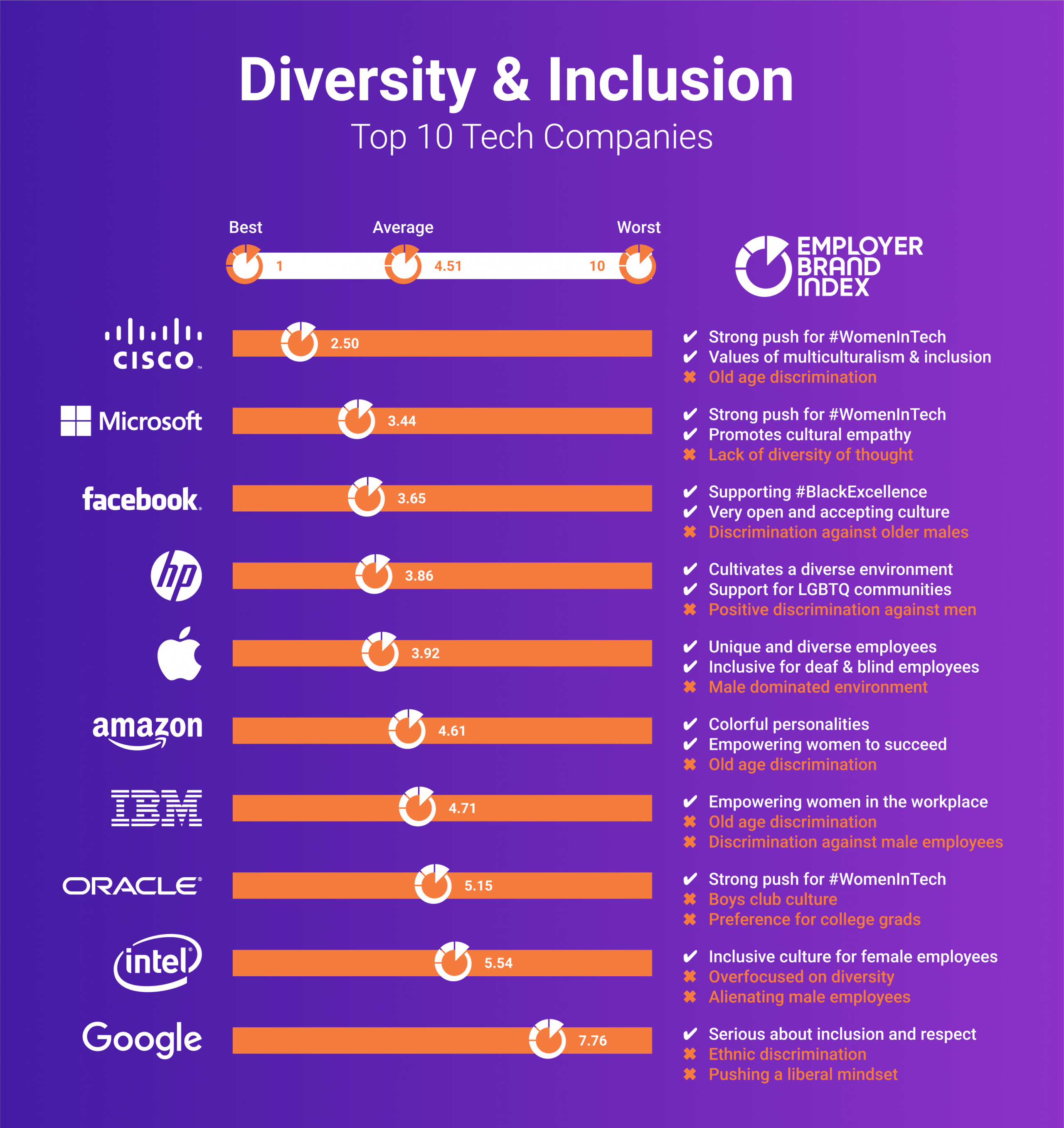
If you were to pick out one industry where the need for diversity and inclusiveness is most prevalent, most of you would say the tech industry. Over the past few years, we have seen plenty of diversity issues arising in some of the biggest tech brands in the world. We won’t name anyone, don’t worry. But now more than ever, many would say the tech industry is pioneering the push for cultural inclusion and gender equality in the workforce.
So we wanted to generate our understanding of the state of diversity in tech, using our proprietary methodology, the Employer Brand Index. We analyzed the following tech companies (ordered alphabetically), picked primarily due to popularity and 2018 sales estimates according to CNBC: Apple, Amazon, Cisco, Facebook, Google, Hewlett-Packard, IBM, Intel, Microsoft, and Oracle.
How we did it:
We scoured through thousands of publicly obtainable comments, updates and reviews on user-generated platforms like Reddit, Glassdoor, Twitter and many more to dissect only data points regarding diversity, inclusion, equality and similar.
We looked at all English language-based comments in Q1 of 2018 (January, February, and March) to ensure that these findings are as current as possible. But it’s important to note that while these findings might be current, they may not be entirely representative.
We then measured these findings using our Employer Brand Index methodology, scoring each company on our 1 to 10 scale, 1 being the best score you can get and 10 being worst. Everyone is aiming for position 1!

NOTE: Below is a summary of why each company scored the way they did. The two things to consider to when reading this is that one, the percentages you will find are based on each individual company, and two, any extremely general comments such as ‘good diversity’ or ‘bad diversity’ are left out in the summary report due to their simplicity, but these findings still played a part in the overall score for each company.
1. Cisco (2.50)
At first place, we have Cisco, who scored very well on our scale due to hugely significant positive sentiment towards their mission to help women thrive in the workplace, which made up 38% of their findings.
We did see also significant commentary on Cisco’s push for inclusion in the workforce (12%) and their values of multiculturalism (8.5%). Negatively, there seemed to be a belief that Cisco favored younger employees over older ones (7%), a trend you will see a lot of throughout this report. But this was their only significant downfall, so there is far more good to celebrate than bad!
2. Microsoft (3.44)
In second place we have Microsoft, who scored well on our scale due to significant positive commentary towards helping female employees flourish in the tech industry, which made up 24% of their findings. We also found positive commentary on the inclusion of people of color (16%) and the environment of cultural empathy at Microsoft which is believed to cultivated by their CEO (6%).
Negatively, some of the issues we found revolved around with lack of diversity of thought at Microsoft (5%), as well as the alienation of some male employees within that process (4%).
3. Facebook (3.65)
What was evident from the get-go at Facebook, who scored well on our scale, was the openness and the inclusiveness of their culture and community (21%). Their evident commitment to #BlackExcellence (13%), showing the company does a lot to promote employees no matter of race or origin. Additionally, like Microsoft and Cisco but on a lesser scale, we see a push for female inclusion in the workplace at a tech company (9%).
One area of concern for Facebook revolved around age discrimination (10%) at the company, where older employees feel they are slowly being replaced by new grads and a millennium-type environment in being cultivated which they don’t feel comfortable in.
4. Hewlett-Packard (3.86)
Hewlett-Packard, or HP inc., scored well on our scale due to generally positive commentary towards the company’s commitment to cultivating a diverse environment in the workplace, which made up 22% of their findings. There was also positive sentiment towards the empowerment of women at Hewlett-Packard (16%), as well as the empowerment of LGBTQ employees (8%).
Where they went wrong seemed to be revolving around their blatant push for diversity (16%), comments such as “Oh look…another program dividing people up by gender and race. Just what America needs!” criticized Hewlett-Packard for using positive discrimination when recruiting talent.
5. Apple (3.92)
Consumer electronics giant Apple also scored well on our scale due to strong commentary about the uniqueness and the multiculturalism of the employees at the company. This is made up of a staggering 34% of their findings. What was also discovered, on a much smaller scale, was positive commentary towards the hiring of deaf and blind employees (8%) at Apple, which highlights their strong policy towards inclusion in the workplace.
Negatively what was found was that 12% of the findings on Apple revolved around the company not being a female-friendly place, the lack of women in leadership or Apple being a male-dominated company.
6. Amazon (4.61)
Jeff Bezos’ empire, Amazon, scored fairly on our scale due to mixed reviews on their approach to diversity and inclusion. While we did find positive commentary on the inclusion of women, LGBTQ employees and those with disabilities, which collectively made up 26% of their findings, as well as the multiculturalism of their employees (17%).
We also found negative commentary on the age discrimination being cultivated at the company (12%), where candidates and employees feel they are “too old” to be at the company or to be hired. As well as the belief, on a lesser scale, that women are not receiving the same opportunities to enter into leadership positions as men (5%).
7. IBM (4.71)
American multinational tech company, IBM, scored fairly well on our scale. What was significant was that while 24% of their commentary celebrates the women-friendly environment at IBM specifically for working mothers, there were minor remarks regarding it still being a boys club, discriminatory towards women, and a lack of women in leadership. Although, these findings only made up 7% of their commentary.
On a lesser scale, we did also find negative commentary about the discrimination against older employees at IBM (12%), as well the alienation of male employees (6%) in their push to achieve inclusiveness.
8. Oracle (5.15)
Computer technology giants, Oracle, achieved an average score on our scale. The most significant finding was their commitment towards women, with many of their female employees sharing their stories of empowerment in the workplace. This made up 23% of our findings on Oracle. While these findings were promising, there were rumblings of a ‘boys club’ culture at the company (12%), with a few allegations of sexism and a pay gap between men and women.
Other significant findings revolved around the enjoyment of working with multicultural individuals on a daily basis (11%), as well as the fact that some people believe Oracle is turning into an ‘under 30’ environment with a preference for college grads (10%). Once again the topic of ageism springs up.
9. Intel (5.54)
Intel achieved an average score on our scale due to a mix of different reasons. The one positive theme was the empowerment of their female employees (12%), in areas such as being inclusive towards mothers and cultivating a healthy gender balance. On the other hand, the one negative topic collated from the research was an over-focus on pushing out diversity images at Intel (12%), primarily it being ‘irrelevant’ and a ‘marketing stunt.’
On a smaller scale, we found that people believed Intel cultivates an inclusive and diverse environment (8%), as well as minor issues with the alienation of male employees (7%). There was a discussion about problems with equal pay, racism and prejudice, and a boys-club culture, but these areas were not communicated enough times to be representative.
10. Google (7.76)
For some of you, this may not be a complete surprise, especially as regards to the some of the issues Google has faced in the past few months. And our research in many ways confirmed these problems, with Google scoring poorly on our scale primarily due to issues regarding the alienation of white employees and Asian employees, which made up 24% of their findings. As well as some people believing that you have to have a liberal mindset (15%) and the lack of diversity in thought that comes about within this.
On a minor scale, there was the evident empowerment of the female employees at Google. But this only made up 6% of their findings. Yet it’s significant because of the prevalence of the topic throughout this research.
The commitment to women in tech is real
What is evident is that there is a real commitment to empowering women in tech, with all 10 tech giants showing positive commentary, some more than others, towards this topic.
We found a plethora of women celebrating each other and their achievements at these companies, as well as many mentions of the women-friendly environments being cultivated in their workplace.
All is not perfect for women, with what still seems to be a lack of women in leadership positions and a disparity in pay between men and women. But based on the overall outlook of this research, we are confident that things are on the up for women in the tech industry!
Is the tech industry finally embracing diversity?
The narrative for a long time is that the tech industry, especially topics such as computing and coding, are interests reserved for boys only. And yes, at times, this theory was backed up in our research, with the referencing of a “Boy’s club” environment at companies such as IBM and Oracle.
But the tech industry is trying to change things. For example, in this research, we saw positive commentary on:
- The inclusion of LGBTQ employees
- The empowerment of people of color
- The multiculturalism being cultivated in the workplace
- The support of women and working mothers
All of these aspects represented a positive step in the direction that the tech industry is taking and the various strategies these companies are taking to improve their diversity and inclusion.
Within this process of diversity and inclusion, some believe there might be the existence of positive discrimination towards one specific demographic: white males. This was backed up by Google’s low scoring (7.76) on the Employer Brand Index due to the belief that some employees are discriminated against because they are white and of the male gender. As well as the alienation of males in general throughout this research in places such as Microsoft and Intel.
So while it is evident that the tech industry is doing their all to balance out racial and gender disparities at their businesses, are they doing this at the expense of white males?
Ageism in the tech industry
One of the more prevalent topics in this research was the idea that the tech industry was a young or millennial industry. This was backed up by the negative commentary found at Facebook and Amazon where people felt like they were slowly being replaced by grad students or that working environment itself is no place for someone above the age of 30.
So while there is much focus in the tech industry on racial, cultural and gender-focused diversity initiatives, there seems to be less focus on reducing the culture of ageism being cultivated. With Generation Z entering the workforce, and what will be four different generations working and looking for work, this diversity in age and experience can be extremely valuable to the tech industry.
Interested in how your company measures up for D&I and other attributes? Check the Employer Brand Index today.
STAY CONNECTED.
DATA-DRIVEN EMPLOYER
BRAND INSIGHTS.
Our newsletter is exclusively curated by our CEO, Jörgen Sundberg, for leaders who make decisions about talent. Subscribe for updates on The Employer Branding Podcast, new articles, eBooks, research and events we’re working on.



